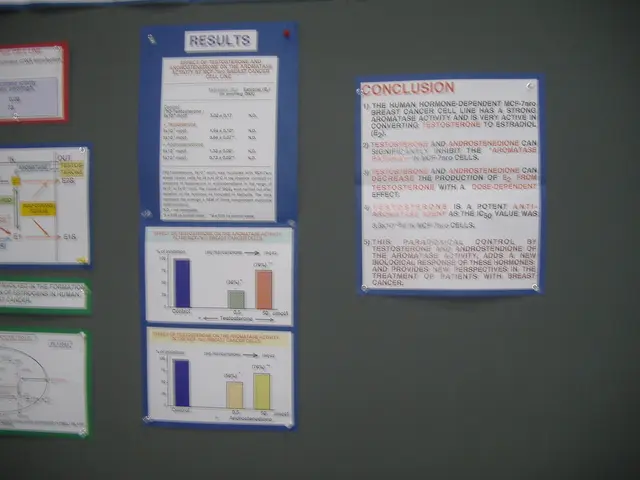Enhancing Lifespan Potentially by Nearly 2 Years Through Regular Coffee Consumption (On Average)
The potential benefits of coffee consumption for longevity have recently surfaced, with a comprehensive review suggesting that drinking coffee regularly could prolong lifespan by nearly two years on average.
In light of this groundbreaking finding, published in Ageing Research Reviews, we explore the evidence supporting coffee's purported health benefits and the underlying mechanisms that may contribute to a longer lifespan.
Understanding the Evidence
A team from the University of Coimbra in Portugal analyzed over 50 studies and found that moderate coffee consumption, approximately 3 cups daily, is associated with an additional 1.84 years of lifespan. This finding extends beyond just a longer lifespan, as it also indicates a reduced risk of severe diseases like heart disease, cancer, and respiratory issues.
The review also reveals that coffee may contribute positively to cognitive function in older adults, reducing depression and frailty. As such, it seems that coffee might not only help you live longer but also healthier and more vibrantly.
Impact on Healthspan
What makes coffee's potential impact on longevity even more intriguing is its effect on healthspan – the period an individual spends free from major illnesses. In essence, coffee's benefits may not just add years to life but also years of good health, making it valuable for aging populations.
Investigating the Mechanisms
The research suggests that coffee's antioxidant and anti-inflammatory properties could be the keys to its longevity-promoting effects. Coffee compounds such as polyphenols and chlorogenic acids help protect cells from damage and reduce aging-related diseases. Additionally, coffee might reduce inflammation, a key driver of chronic conditions like cancer and heart disease.
Improved insulin sensitivity, enhanced DNA repair, and stress adaptation may also contribute to coffee's impact on longevity. It's essential to note, however, that the exact mechanisms are still under investigation, and the complete picture is yet to be fully understood.
Supporting the Claim
Several studies support the findings of the Coimbra review. For instance, a 2022 study from Harvard Health found that daily coffee consumption was linked to a significantly lower risk of dying within seven years, with benefits tapering off after 4.5 cups daily.
Another article from Healthline in 2019 highlighted that coffee drinkers have a lower risk of Alzheimer's, Parkinson's, type 2 diabetes, and liver diseases, suggesting coffee adds both years to life and "life to your years."
A 2018 study from Harvard T.H. Chan School of Public Health found that drinking up to eight cups daily was linked to a 14% lower risk of early death compared to non-drinkers. These findings align with the Coimbra review, reinforcing the association between coffee and longevity.
A Shift in Perception
Traditionally, coffee has been debated for its health impacts, with many believing it to be detrimental to one's health. This perception, however, has been challenged by recent research. Contrary to popular belief, coffee no longer appears to be the villain it once was; instead, it might prove to be one of the healthiest beverages you can drink.
For example, a meta-analysis in European Journal of Epidemiology found coffee consumption linked to reduced mortality from various causes, including cardiovascular disease. Another study in Circulation showed coffee drinkers had a lower risk of heart failure, challenging the notion that coffee harms heart health.
As such, transitional phrases like "however" and "on the contrary" help signal this change, making the narrative engaging for readers on platforms like Flipboard.
Balancing Benefits and Risks
While the evidence is encouraging, it's essential to keep in mind that most studies are observational, demonstrating association rather than causation. Additionally, the review's industry funding raises concerns about potential bias, underscoring the need for further randomized controlled trials to confirm causality.
Individual responses to coffee consumption vary, and regular use can lead to dependence, with withdrawal symptoms like headaches. Pregnant women should limit consumption, as high intake is linked to complications like low birth weight.
Those with anxiety or high blood pressure should monitor their intake, as caffeine can exacerbate symptoms. Timing is also crucial, as caffeine late in the day can disrupt sleep, with recommendations to avoid afternoon coffee.
In conclusion, coffee, when consumed in moderation, appears to offer significant health benefits, potentially adding nearly 2 years to lifespan and extending health span. Future research will help clarify the exact mechanisms underlying these findings, enabling more informed decisions about coffee consumption and its impact on longevity.
References
- Impact of coffee intake on human aging: Epidemiology and cellular mechanisms
- Drinking coffee might lengthen life
- Coffee and Longevity: Do Coffee Drinkers Live Longer?
- Coffee consumption and risk of total and cause-specific mortality
- Long-term coffee consumption and risk of cardiovascular disease
- Cardiovascular effects of coffee and caffeine
- Coffee consumption and risk of type 2 diabetes
- Beyond adding years to lifespan, the findings suggest that coffee may also contribute positively to health-and-wellness, reducing the risk of severe diseases such as heart disease, cancer, and respiratory issues, while potentially enhancing cognitive function, reducing depression, and increasing overall vibrancy in older adults.
- In addition to the potential impact on longevity, the research indicates that coffee may also affect healthspan, contributing to a period of good health and fewer major illnesses, making it particularly valuable for aging populations.







